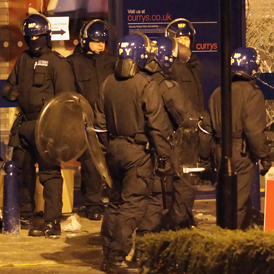London riots in ‘unprecedented’ year for Met Police
In the run-up to the Olympics the Met Police are dealing with chaotic scenes of violence on London streets. Channel 4 News asks a former senior officer if plans for London 2012 will be affected.

The London riots have come at a fragile time for the Metropolitan Police.
The force is in the process of replacing two of its most senior officers following the phone-hacking scandal, and faces an inquiry into the relationships between the press, police and politicians.
The controversy comes as the shadow of the Olympics and Paralympics looms over London – the biggest show on earth comes to the capital in just over 11 months.
In the days after Sir Paul Stephenson resigned as commissioner he said if he was going to step down, he wanted to do it “speedily” to give his successor time to settle in before the games began.
Only weeks after Sir Paul and Assistant Commissioner John Yates resigned, the Met now faces criticism about its response to the weekend riots.
Senior officers says there was “no intelligence” to predict the violence which erupted in Tottenham and other parts of London over the weekend
But former Deputy Assistant Commissioner Brian Paddick told Channel 4 News that “it could be argued it was reasonable to anticipate violence” given there had been riots before following public deaths at the hands of police officers.
The Olympic challenge
Brian Paddick said the force was in unchartered territory: “Clearly the Met has had difficult years in past but there are a combination of things we haven’t seen before in addition to challenging policing situations.
“We’ve had criticism of Met’s handling of a major investigation, allegations of corruption and we’ve lost a second commissioner within a few years, which is unprecedented.”
He added that the two big policing issues during the Olympics would be public order, in terms of making sure large crowds could get around safely, and anti-terrorism.
“The difficulty with the anti-terrorism issue is that over last five years the Met has lost considerable expertise in terrorism, and the resignation of John Yates is another example of that.”
In 2007 Assistant Commissioner Andy Hayman resigned during an investigation into his expenses. A few months later Deputy Assistant Commissioner Peter Clarke, who led the investigation into the 7 July attacks, retired.
In 2009 the country’s most senior counter-terrorism officer, Bob Quick, resigned after accidentally revealing a secret document to press photographers outside Downing Street, and most recently Assistant Commissioner John Yates stepped down amid the phone-hacking controversy.
Mr Paddick said the “significant loss of expertise” in counter-terrorism would not be easily replaced, but there was still potential for people to work on a consultative basis in the run-up to 2012.
He added that the London riots would have no effect on the Olympics operation and said it was good that the officer in charge of London 2012, Assistant Commissioner Chris Allison, is still in place.
A spokesman for the Metropolitan Police told Channel 4 News that preparations for the Olympics had not been adversely affected by the resignations of Sir Paul Stephenson and John Yates, and that Assistant Commissioner Chris Allison was “firmly in control”.
